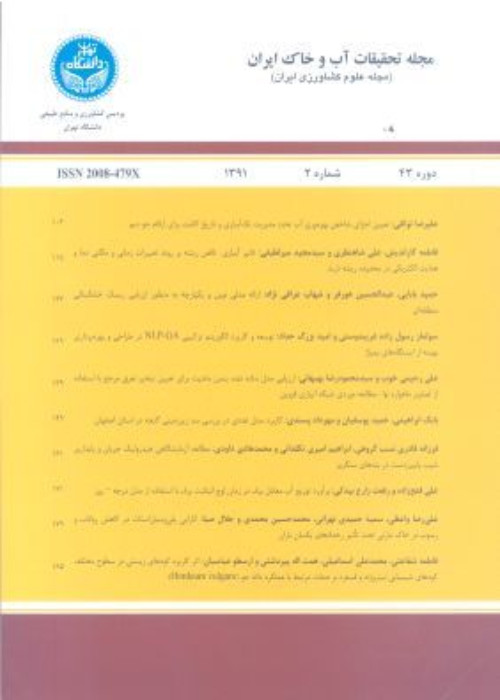The Effect of Irrigation with Magnetically Treated Effluent on Uptake of Some Heavy Metals in Maize Cultivation
Author(s):
Article Type:
Research/Original Article (دارای رتبه معتبر)
Abstract:
At present, due to the severe crisis of water resources, the reuse of treated effluent and wastewater in the agricultural sector is of great importance. Heavy metals in wastewater are the most important types of environmental pollutants. The goal of this research is to investigate the effect of using magnetically treated effluent on the uptake of heavy metals in maize. For this purpose, a factorial experiment was conducted in a randomized complete block design with three replications in 2020 at Babolsar city. Treatments included irrigation with well water (W1), irrigation with mixed water (25% of effluent and 75% of well water, W2), irrigation with the mixed water (50% of effluent and 50% of well water, W3), irrigation with mixed water (75% of effluent and 25% of well water (W4), irrigation with 100% effluent (W5) under magnetic field (I1) and without magnetic field effect (I2). At the end of the period, the elements of lead, cadmium, zinc and nickel were measured in aerial parts and seeds of maize. The results showed that the effect of irrigation type and mixed water on the concentration of all elements in aerial parts and seeds of maize was significant at the level of one percent probability. By applying a magnetic field, the concentrations of lead, cadmium, zinc and nickel in the aerial parts of plant decreased by 17.84, 15.9, 14.22 and 13.92% compared to non-magnetic treatment, respectively. With increasing the percentage of effluent in the mixed water for irrigation, the concentration of all elements increased significantly. The maximum concentration of elements in aerial parts and seeds of maize was related to zinc, which was 93.19 and 74.32 mg/kg respectively. The lowest concentrations of heavy metal uptake in aerial parts and seeds of maize were cadmium (0.73 mg/kg) and nickel (3.61 mg/kg), which were corresponded to W5 treatment. Therefore, by using magnetic effluent as irrigation, the accumulation of heavy metals in the soil can be reduced and its absorption by maize can be prevented. Due to the high uptake of elements by the maize plant, when irrigating with effluents, it is advisable to select plants that have less potential for the accumulation of heavy metals.
Language:
Persian
Published:
Iranian Journal of Soil and Water Research, Volume:53 Issue: 5, 2022
Pages:
1079 to 1091
magiran.com/p2514077
دانلود و مطالعه متن این مقاله با یکی از روشهای زیر امکان پذیر است:
اشتراک شخصی
با عضویت و پرداخت آنلاین حق اشتراک یکساله به مبلغ 1,390,000ريال میتوانید 70 عنوان مطلب دانلود کنید!
اشتراک سازمانی
به کتابخانه دانشگاه یا محل کار خود پیشنهاد کنید تا اشتراک سازمانی این پایگاه را برای دسترسی نامحدود همه کاربران به متن مطالب تهیه نمایند!
توجه!
- حق عضویت دریافتی صرف حمایت از نشریات عضو و نگهداری، تکمیل و توسعه مگیران میشود.
- پرداخت حق اشتراک و دانلود مقالات اجازه بازنشر آن در سایر رسانههای چاپی و دیجیتال را به کاربر نمیدهد.
In order to view content subscription is required
Personal subscription
Subscribe magiran.com for 70 € euros via PayPal and download 70 articles during a year.
Organization subscription
Please contact us to subscribe your university or library for unlimited access!



